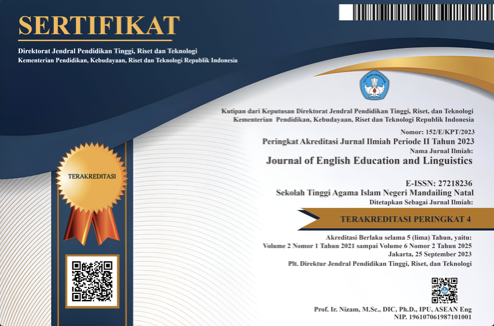SPEECH ACTS ANALYSIS ON LILLY CONTINO’S COMPLAINT VIDEOS IN A RESTAURANT SETTING
DOI:
https://doi.org/10.56874/jeel.v5i1.1729Keywords:
Speech Acts, complaint, complaining strategyAbstract
This study examines the use of Speech Acts complaining in Lilly Contino’s misgendering videos. Using Speech Acts categorizations by Searle (1969) and Moon’s (2002) complaining framework, the study aims to identify the strategy of complaints used by Lilly Contino and to examine its effectiveness. The study reveals that Lilly Contino used both implicit and explicit strategies. The implicit strategy used as an initial complaint by using assertive Speech Acts comprises reaffirming, recognizing, and stating, the explicit strategy used as a follow-up complaint by using directive Speech Acts includes demanding and requesting; and the expressive Speech Acts is used as well encompass Lilly’s personal feeling. It is also found that the implicit strategy is less effective for complaints rather than the explicit one. The study furthermore reveals that complaining has its level to address offensive situations. Therefore, this study is particularly useful for understanding the intent of complainers and how the hearer develops a suitable apology.
References
Argyris, Y. A., Monu, K., Kim, Y., Zhou, Y., Wang, Z., & Yin, Z. (2021). Using Speech Acts to Elicit Positive Emotions for Complainants on Social Media. Journal of Interactive Marketing, 55, 67–80. https://doi.org/10.1016/j.intmar.2021.02.001
Brown, P., Levinson, S. C., & Gumperz, J. J. (2018). The argument: Intuitive bases and derivative definitions. Politeness, 61–84. https://doi.org/10.1017/cbo9780511813085.007
Creswell, J. W., & Poth, C. N. (2007). Choosing Among Five Approaches Choosing Among Five Approaches (Issue June). https://www.researchgate.net/profile/Rulinawaty-Kasmad/publication/342229325_Second_Edition_QUALITATIVE_INQUIRY_RESEARCH_DESIGN_Choosing_Among_Five_Approaches/links/5eec7025458515814a6ac263/Second-Edition-QUALITATIVE-INQUIRY-RESEARCH-DESIGN-Choosing-Among
Decock, S., & Spiessens, A. (2017). Customer complaints and disagreements in a multilingual business environment. A discursive-pragmatic analysis. Intercultural Pragmatics, 14(1), 77–115. https://doi.org/10.1515/ip-2017-0004
Deveci, T. (2015). The Complaint Speech Acts Set Produced by University Students Speaking English as a Foreign Language. Literacy Information and Computer Education Journal, Special 4(1), 2161–2171. https://doi.org/10.20533/licej.2040.2589.2015.0287
Fahdian Puksi, F. (2016). Tindak Tutur Mengeluh Pada Empat Laman Penyedia Review Hotel. https://www.researchgate.net/publication/329416373
Fiqih, E. A., & Sudana, D. (2022). Speech Acts of complaining on the review page of the e-commerce platforms in Indonesia. AMCA Journal of Science and Technology, 2(1), 14–17. https://doi.org/10.51773/ajst.v2i1.132
Ghaznavi, M. A. (2017). The Speech Acts of Complaining: Definition and Characterization. British Journal of English Language, 3(1), 87–95. https://doi.org/10.1016/j.procs.2019.01.106%0Ahttps://doi.org/10.1016/j.apenergy.2019.114422%0Ahttp://dx.doi.org/10.1016/j.ijfatigue.2008.11.016%0Ahttp://www.ansr.pt/Estatisticas/RelatoriosDeSinistralidade/Pages/default.aspx%0Ahttp://dx.doi.org/10.1016/j.
Gunarathne, P., Rui, H., & Seidmann, A. (2017). Whose and What Social Media Complaints Have Happier Resolutions? Evidence from Twitter. Journal of Management Information Systems, 34(2), 314–340. https://doi.org/10.1080/07421222.2017.1334465
Hassouneh, I., & Zibin, A. (2021). Analysis of complaining strategies on services offered to Facebook users on Zain Jordan. Journal of Language and Linguistic Studies, 17(2), 1141–1159. https://doi.org/10.17263/jlls.904138
Hasyim, M. (2020). The Speech Acts of Complaint: Socio-Cultural Competence Used by Native Speakers of English and Indonesian. International Journal of Psychosocial Rehabilitation, 24(06), 2020.
Jin, M., & Aletras, N. (2021). Modeling the Severity of Complaints in Social Media. NAACL-HLT 2021 - 2021 Conference of the North American Chapter of the Association for Computational Linguistics: Human Language Technologies, Proceedings of the Conference, 2264–2274. https://doi.org/10.18653/v1/2021.naacl-main.180
Kumala, A. F. I. (2018). an Analysis of Speech Acts in the Croods Movie. International Journal AJES, 1(1), 1–8. http://www.ejurnal.undana.ac.id/AJES
Laabidi, A., & Bousfiha, A. (2020). Speech Acts of Complaining: Socio-Pragmatic study of Complaint by Moroccan EFL Learners. International Journal of Language and Literary Studies, 2(2), 148–155. https://doi.org/10.36892/ijlls.v2i2.294
Moon, K. (2002). Differences Between Native and Nonnative Speaker Complaint. 1972.
Preotiuc-Pietro, D., Gaman, M., & Aletras, N. (2020). Automatically identifying complaints in social media. ACL 2019 - 57th Annual Meeting of the Association for Computational Linguistics, Proceedings of the Conference, C, 5008–5019. https://doi.org/10.18653/v1/p19-1495
Searle, J. R. (1969). Speech Acts. Cambridge University Press.
Downloads
Published
Issue
Section
License
All articles published in the Journal of English Education and Linguistics are licensed under a Creative Commons Attribution-ShareAlike 4.0 International (CC BY-SA) license. This means anyone is free to copy, transform, or redistribute articles for any lawful purpose in any medium, provided they give appropriate attribution to the original author(s) and Journal of English Education and Linguistics, link to the license, indicate if changes were made, and redistribute any derivative work under the same license.
Copyright on articles is retained by the respective author(s) without restrictions. A non-exclusive license is granted to the Journal of English Education and Linguistics to publish the article and identify itself as its original publisher, along with the commercial right to include the article in a hardcopy issue for sale to libraries and individuals.
Although the conditions of the Creative Commons Attribution-ShareAlike 4.0 International (CC BY-SA) license do not apply to authors (as the copyright holder of your article, you have no restrictions on your rights), by submitting to the Journal of English Education and Linguistics, authors recognize the rights of readers and must grant any third party the right to use their articles to the extent provided by the license.

This work is licensed under a Creative Commons Attribution-ShareAlike 4.0 International License.








